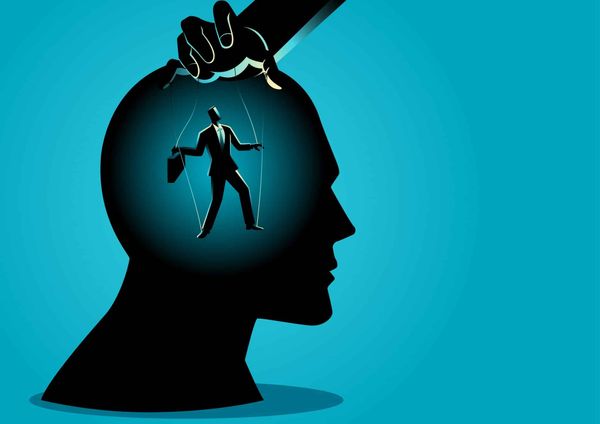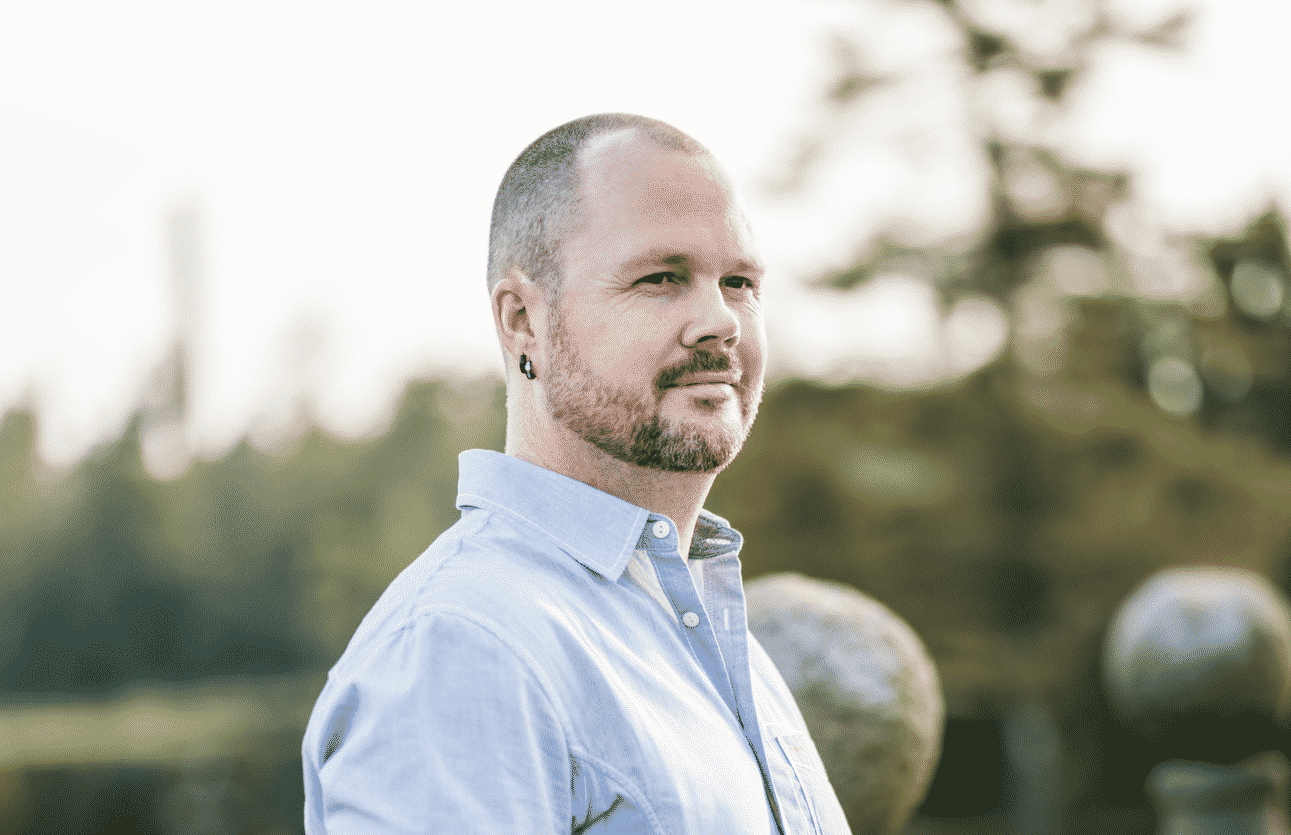Jon Brooks • • 20 min read
Alone in Thailand: How I Built a Meaningful Life From Scratch in 8 Days on a New Continent

I write this article sitting comfortably in my beautiful, expansive office in the old city of Chiang Mai, sipping on a marshmallow frappuccino, intermittently exchanging texts with my Thai female friend (for lack of a better term) about what part of Thailand we’re going to explore tonight on scooter. Life right now is serene and passionate, full of possibilities, potentialities, and aliveness. I feel, dare I say, happy.
However.
When I arrived in Thailand 8 days ago, within moments of entering my apartment I truly entertained the thought that I would die here. I expected to feel homesickness at some point during my six-week stay but not in the first hour. I felt isolated, cut off, as if I was separated from everything I knew and loved by thousands of miles — I was.
The heat was not something I prepared for, nor could I. Going from 50 degrees back home in the UK to the 104-degree “hot season” in Thailand in the space of twenty-four hours f—ked my primal brain into a panicked flux of fight or flight, which no calm reasoning could counteract. In Thailand heat, your clothes are soaked with sweat by default, and breathing feels like someone pointing a hairdryer at your mouth. Walking outside, even for five minutes, brings to mind intrusive images of cooked chicken.
Back at the apartment, my temporary hiding place, things were their own kind of bad. The air con did not work. There was a huge hole in my bathroom ceiling (the perfect entrance point for deadly insects to join the fun), and top it off, I had a pet lizard who came out from behind my wardrobe to introduce himself as soon as I first laid down on my bed. Yeah, I’m definitely not going to survive, I thought.
Of course, I did survive, and then I thrived — humans can be good at that.
In this article, I’m going to tell you about many of the things I did to overcome my fears, isolation, culture shock, and build essentially a new, normal life within eight days. But this article is not a how-to guide for traveling. Instead, it describes some of the most notable insights I gained during my tumultuous first week. All of them, I believe, will stay with me for a lifetime.
1) Choose your worries wisely.
“I’ve had a lot of worries in my life, most of which never happened.”
― Mark Twain
As I mentioned, throughout the first day in Thailand, my brain was running on a paleolithic cocktail of emotions. My senses were sharp, checking every dark corner of every room, ears pricking up at every unusual sound, much like a dear in hunting season. In this heightened state of fear, I couldn’t help but adorn ordinary events with extraordinary significance. A rustle in the bush? It might be a tiger. A shadow on the wall? It must be a deadly spider. Footsteps outside your room? It must be a machete-wielding drug lord.
It takes a certain courage to admit that I was afraid of turning off the lights the first night. For some reason, I couldn’t shake the idea that there was a deadly snake in my room. What if a cobra crawls up my leg in the middle of the night and bites me? Do they have anti-venom here? I wonder if the hospitals are good. As my mind started to free associate in the darkness, an excerpt from book I had been reading on my flight came to me:
The meditation masters in ancient India often used a metaphor for fear: a dimly lit room where you see a rope and think it’s a snake. Much of our fear is like that. It begins with misperception, then one frightened thought leads to another. The practice involves beginning to see clearly: a rope is a rope and a snake is a snake. If there really is a snake in the room, fear may be an appropriate response. But much of our fear is about ropes, which we have never gotten to know, so we spend our lives coping, running, concealing, denying, concocting elaborate verbal explanations.
I did not find this analogy comforting. I already knew I was thinking irrationally and that didn’t make me feel more rational or less anxious. What if that rope I saw earlier was actually a snake. I continued down this thought-path. What if while I was trying to figure out whether a rope was a snake and a snake was a rope a tiger came in from behind and ate me? Although morbid, this thought helped me realize something important about fears.
Read this: 15 Questions on Adventure Answered by the World’s Coolest Traveler
If one wastes time and energy worrying about things that may or may not be threatening, one might miss the real threats. I asked myself two questions: statistically, what should I be afraid of? Statistically, what is most likely to kill me or harm me? The answers I came up with were traffic accidents, dehydration, food poisoning, and sun burn. Instead of trying to fight my worries, I decided to just make sure they were sensible ones. I took a swig of water and went to sleep.
2) Getting lost is a great way to find yourself.
“Sometimes the wrong train can take us to the right place.”
— Paulo Coelho
When I first ventured out of my apartment to explore the local Thai terrain, I was shocked. There were no street-food stalls or awesome coffee shops. I was surrounded by curious little stores run by barefooted locals in every direction, and nobody looked friendly. I thought whoever named Thailand “The land of smiles” must have been strung up by his feet. I wanted food, water, coffee, Wi-Fi, and travel accessories. All I got were peculiar looks and motorcycle fumes.
I went back to my room, connected to the internet and ran a google search:

I found a place on TripAdvisor called “Angel’s Secret,” studied where it was on the map, committed the location to memory, and set out to discover it. I didn’t realize when I began my food hunt that I had read the map upside down and was headed in the opposite direction.
I spent about an hour walking around in the scorching Chiang Mai heat in search for “Angel’s Secret,” and I obviously didn’t find it. I did find, however:
— An amazing fresh smoothie place
— A Thai version of Starbucks
— A beautiful school with bountiful grounds
— A $10 all-you-can-eat sushi place
— A large supermarket chain full of useful items
— A two-story stationary shop
— A taxi rank
Many of those places I returned to throughout my visit.
During this walk I learned the value of getting lost. Sometimes the best thing that can happen to you is not finding what you were looking for.
Peter Matthiessen in his book The Snow Leopard recounts his five-week trek in Nepal where he searched for the rare and beautiful snow leopard. Did he spot one? No, but his search became a masterpiece.
3) We become that which we fear.
He who fights with monsters should be careful lest he thereby become a monster. And if thou gaze long into an abyss, the abyss will also gaze into thee.
— Friedrich Nietzsche
The first time I went to a nightclub in Thailand, I took a baby-step approach. My goal was simple: find out where the bars were, get one drink there, and go home. No big, epic night out; those will come later (and they did). The clock hit 11PM, and I headed out the door. In Chiang Mai, there are lots of alleys. In fact, it’s hard to go anywhere at night without going through a few dark alleys. But hey, it’s that or stay home, so I chose that. I wasn’t long into my walk when I started to feel the ground shake. In an otherwise peaceful city, the sound of a huge booming bass stuck me as odd, but also alluring.
I followed the beat, and it led me to a cove of roughly twenty bar-clubs full of drunk backpackers and raving locals. The anxiety started to swell in my core. Everyone looked like they knew each other. I felt like didn’t know anyone, because I didn’t. Ugh, Do people think I’m one of those creepy guys who goes out on his own and stands in the corner? I awkwardly waded through the crowds, got to the bar, and ordered a cocktail. Even though I was anxious, I was proud of myself for coming this far. This was my third day alone in Asia.
Weirdly, the bar closed at midnight because the government was cracking down on nightlife. So, I left and proceeded home. As I was walking down one of the many desolate roads, a motorbike which was coming in the opposite direction slowed and stopped next to me. I glanced up expecting to be asked for directions and was instead met with two long, tanned legs and flowing black hair. “You want a ride home?” she asked. Ah, I guess this is my first encounter with a Thai prostitute. “No, thanks. I like walking.” I felt an awkward sensation in my body as I said this. I guess my conditioning has made me feel that rejecting a direct proposition from the opposite sex is on some level unkind. I kept moving.
Read this: 11 Takeaways From 8 Months of Unemployed Nomadism
I was now about a hundred yards away from my apartment. I just had to walk down one more alley and I was home. As I took the final turn, I noticed a shadow right outside my front entrance. I stopped. What is that? Oh, it’s a dog. A big black dog, and it looks hungry. I had read stories online about aggressive, pack-hunting dogs in Thailand, and I didn’t want cross any if I could help it. But I did really want to go home, so I scanned the floor for a weapon and found a decent sized rock. I locked it in my palms and stalked the dog as it scavenged in the moonlight.
Just then, the same prostitute from earlier rode up behind me, this time with two male accomplices. They all stopped, and I turned around. They took one look at me, then at each other, then scrambled off. I don’t blame them. I looked like a crazy-eyed, rock-wielding ogre — not the type of person you’d want to meet in a dark alley. Eventually the dog moved on and I crept home to sleep. The next morning, as I left my apartment, I passed an adorable puppy sitting outside. He looked strangely familiar. Lesson learned.
4) Work is the punctuation of life.
“Hide not your talents, they for use were made,
What’s a sundial in the shade?”
― Benjamin Franklin
I am one of the four co-owners of HighExistence, and I love what I do. I work with amazing people and have lots of flexibility. But for the first three days of my trip I did not do any work. My visit to Thailand was always meant to be a working holiday, not a luxury vacation, and although the two are not mutually exclusive, I quickly found that too much flexibility is too much.
So on my fourth day, I set out to find a co-working space. I did a quick Google search and found Punspace. I fell in love:
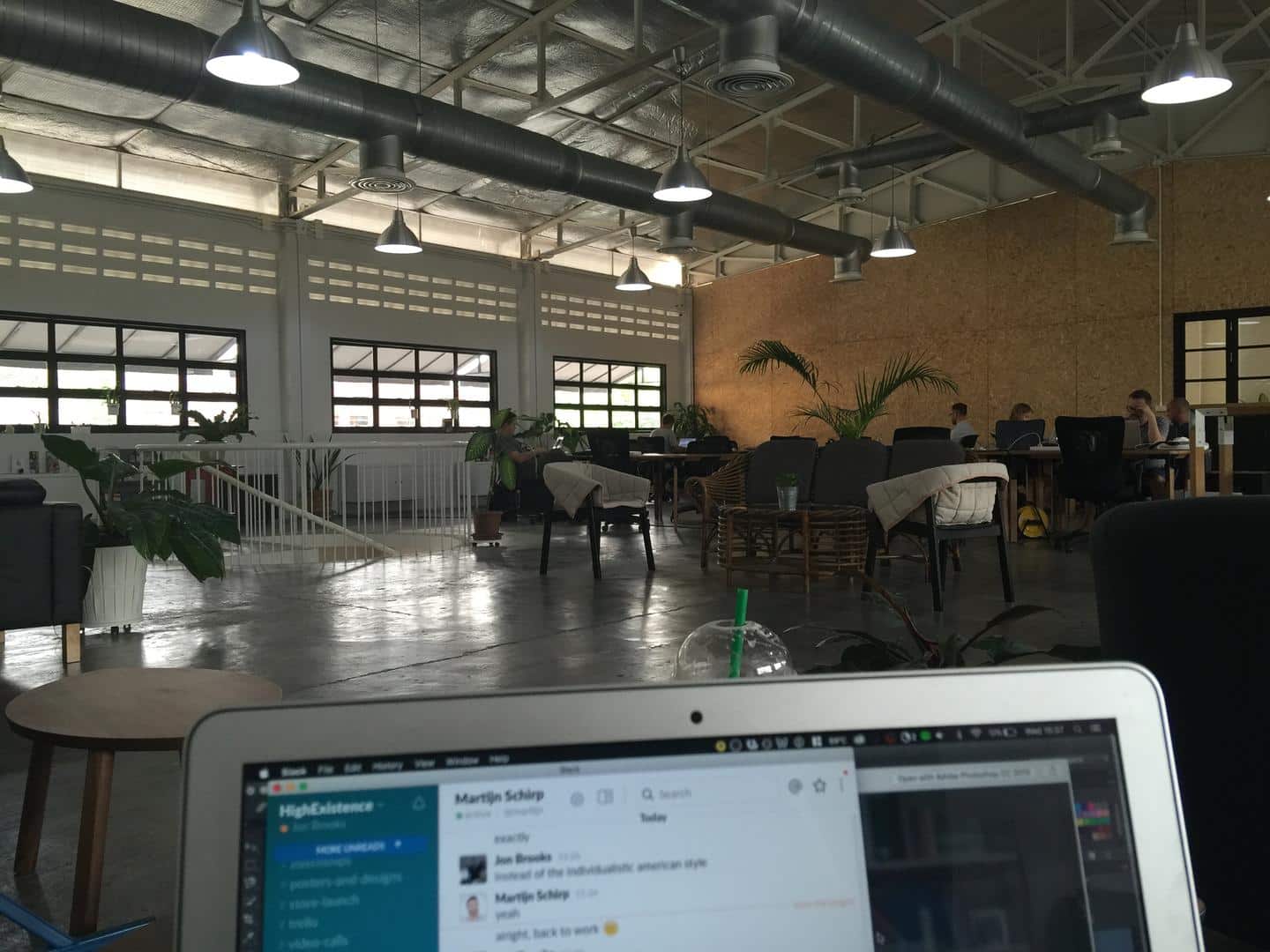
When I resumed my work, I felt as though I had a purpose again — a reason to get out of bed beyond having a nice breakfast and an iced cappuccino. As I started to write again for the first time in days, I saw that just as punctuation helps keep our written thoughts comprehensible, the punctuation of life — work and recovery — help prevent our lives from rambling into obscurity. Getting lost in hedonism will take you high, but the mundanity of work anchors one foot to the floor.
5) Life begins at the end of your comfort zone is an annoying cliché, but it’s also true.
For all sad words of tongue and pen, The saddest are these, ‘It might have been’.
— John Greenleaf Whittier
It was my fourth day in Thailand and I decided it was time to meet people. Initially, I thought I’d do this where I worked, but it turned out Punspace was eerily silent. Nobody talked there. Great for work, not great for social life. I had received a bunch of good suggestions when it came to making friends. Go on couchsurfing.com, go out to the local night clubs and get wasted, go on group trips. While these seemed like worthwhile pursuits, I decided to take another approach: Tinder, the dating app.
I had never used Tinder before, and I had only two half-decent pics of myself. What the hell? Why not? But after about ten minutes on the app, I realized that this may not be the best strategy for me.

Eventually, I did match with someone who seemed cool and who shared a passion for art and graphic design. Because my time in Thailand was limited, I asked to meet up the same evening we initiated conversation — she lived ten minutes away. Up until this point I had barely spoke to a Thai person for more than five minutes, and now I was about to go on a date with one on a rooftop bar. A part of me kept hoping that she’d cancel the date so I could remain comfortable. But she didn’t.
As I was walking to the date location I felt self-conscious, nervous, and inadequate. What if it goes wrong? What if we have nothing to talk about? What if she thinks I’m a let down? Here I was — in a foreign land, going into a foreign place, meeting a foreign person for the first time in a semi-romantic setting. To get through my angst, I forced myself to repeat a mantra: whatever happens it will make for an interesting story.
I wanted to gain some comfort with my environment, so I went to the bar early and ordered a Long Island Iced Tea. The bar man had to look up a recipe sheet to make it. The rooftop had a great view overlooking much of Chiang Mai’s nightscape, but the place itself was small with only one couple present. I sat in a corner seat and started checking my phone. From her Tinder profile this girl seemed classy and calm. Because her texts were short I expected her to be quiet and submissive and that I would have to make most of the conversation. Time ticked on and she still hadn’t arrived. She’s not gonna come. As weird as it sounds a part of me was hoping that would be true. Then a girl walked into the bar.
She was tiny: 150 cm, 40 kg, but had a fiery intensity I was not expecting. She glided up to me. We hugged. Then she looked me in the eye and said, “I was waiting for you downstairs,” semi-annoyed. I immediately apologized. “It okay,” she said, and we sat down. Wow, this girl is even more beautiful in real life, I thought — this must be a first for Tinder.
“How was your day?” I asked. She paused for a moment, thinking, and smiled. It was a real smile, which radiated from within her body and beamed out through the corners of her eyes and into mine. Her smile was so warm, so penetratingly glowing, I could do nothing else but smile back.
Feem and I hung out a lot during my stay in Thailand. She took me around on her scooter, showing me parts of her hometown I wouldn’t have otherwise seen. But more than that she welcomed me into her inner-universe, a place I found more intoxifying and novel than anything around her. I’m glad she didn’t cancel that date, and I’m glad I didn’t choose comfort over life.
6) We are always value-scanning our environment unconsciously.
“Marketing is no longer about the stuff that you make, but about the stories you tell.”
— Seth Godin
On my fifth day in Thailand, during my regular lost wandering, I found a Boots store — the pharmacy. I needed a new toothbrush, so I went in and found the dental aisle and starting scanning over the selections. About three minutes passed and I was still unable to make a choice. Why is it so hard to pick a toothbrush? I thought. And then I realized: back home I would not be scanning through the toothbrushes. I would be scanning the prices of the toothbrushes to help me decide which one to buy. Because I had only been in Thailand a few days, I couldn’t quickly equate the Thai currency with value. This “price before features” approach to the world of goods affects us more than we realize, and don’t marketers know it. Of course, sometimes looking at the prices of things can be useful, but in the case of a toothbrush? I grabbed one at random and headed to the checkout.
On the surface, this might strike you as an insignificant insight. Sure, we look at prices to help us buy stuff. But for me, this highlighted a deeper issue in my perception of the world. I really believed I was looking at toothbrushes. But I wasn’t. Where else do I make life decisions based on an invisible, arbitrary price tag someone else has set? I interpreted this insight as a warning about value-judgments about other people. If we are going to assess someone else’s character, let’s make sure it’s based on their character, and not a proverbial price tag someone else has attached to them.
7) Self-amusement is the key to making new friends.
“Your days are numbered. Use them to throw open the windows of your soul to the sun. If you do not, the sun will soon set, and you with it.”
― Marcus Aurelius
One of my favorite parts of my Thailand adventure was waking up in the morning and messaging my family on WhatsApp about what I had been up to the previous night. There was always some interesting story to be told, involving new people I had met. On my 7th day in Thailand, my family received this message from me:
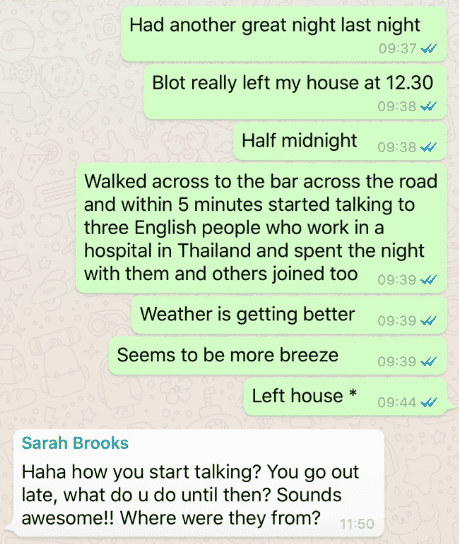
This wasn’t the first time I had sent such a message, and my sister was right to ask how I started talking. I would have asked the same. After all, one of the most life-changing aspects of travel can be the people you meet on the road, which is why I found it strange how quite a few travelers I had met in Thailand seemed to live an isolated existence. As someone who’s experienced social anxiety and introversion, getting to a point where I’m able to walk into an new city alone and make friends, I feel as though I have some ideas worth sharing on this topic.
This was my short answer:
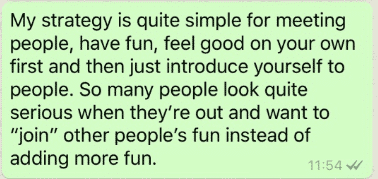
Now I want to tell you the long answer. Let’s go back to that night:
I had worked long hours that day, grinding all the way through sunset. Midnight passed and I was neither tired nor entertained, so I threw on a t-shirt and took a stroll to “Spicy,” a local bar. I arrived there at around 12:30, sober and with no expectations.
Within five minutes of my arrival, I met three British biochemistry students who worked in a Thai hospital. One of the girls in the group had approached me and made a comment on the size of my phone — we hit it off. Before she approached I was having lots of fun on my own, laughing at funny text messages and watching some ridiculous yet awesome dancers let loose. Soon, two Irish guys joined the group and we all jumped in a Tuk Tuk to head to “Good Morning Bar,” so called because it was open till morning. There, I introduced myself to an English girl, and her male friend quickly introduced himself to me. We all laughed about that moment together. The eight of us hung out till it was time to say good morning.
The next evening, I was having a beer with Andrew, an American guy I’d met through a Facebook digital nomad group, and the English guy and girl from the previous night walked past and recognized me. I offered them to join us. They did, and we soon turned to the topic of travel; specifically, making friends on the road. Kieran, the English guy, was traveling around Asia with two female friends, staying in hostels.
He turned to me, “So Jon, which hostel are you staying in? You’re living with loads of people, right?”
“I’m actually living on my own, and I came here alone,” I said.
“Really? That’s brave, I couldn’t do that. So you’ve been living here ages then?”
“No, just over a week.”
“How is it that every time I see you, you’re with someone different?”
“Well, you know how it is. People are so friendly here.”
Of course, that wasn’t the whole answer, but it’s certainly part of it. Having the global belief that people are inherently friendly and want to make friends with you is essential. Humans are like mirrors: when someone gazes into your eyes with no distrust or judgment and fully expects you to be nice, it’s hard not to surrender into that role. I mentioned earlier how we can easily become that which we fear, but the reverse is also true: we can become that which we love.
Read this: 25 Psychological Life Hacks that Will Help You Gain the Advantage in Social Situations
Expanding on that, the best quality one can cultivate for a great social vibe is self-amusement. When I went out alone, I would challenge myself to try and have more fun than anyone else there. Most people who go out, unconsciously value-scan the environment for people having more fun then try and leech off them. They are walking up to people with an empty glass, asking for it to be filled. When you are able to self-amuse, you fill your own glass and offer it to people you meet. You are at the cause of good emotions, not the effect.
Compare the two scenarios below and think about the difference in social energy you’d be putting out:
1) You have to walk up to a stranger and convince them to take $100 of your money.
2) You have to walk up to a stranger and convince them to give you $100 of their money.
Self-amusement can be very subtle and extends into interactions too. If you’re telling someone a story, for example, and you’re searching for their approval, you’re trying to take from them. If, on the other hand, you’re telling a story you enjoy telling, which generates positive emotions within yourself regardless of the reaction, you are now offering something genuine and consequently valuable.
The next morning, I sent this message to my family:
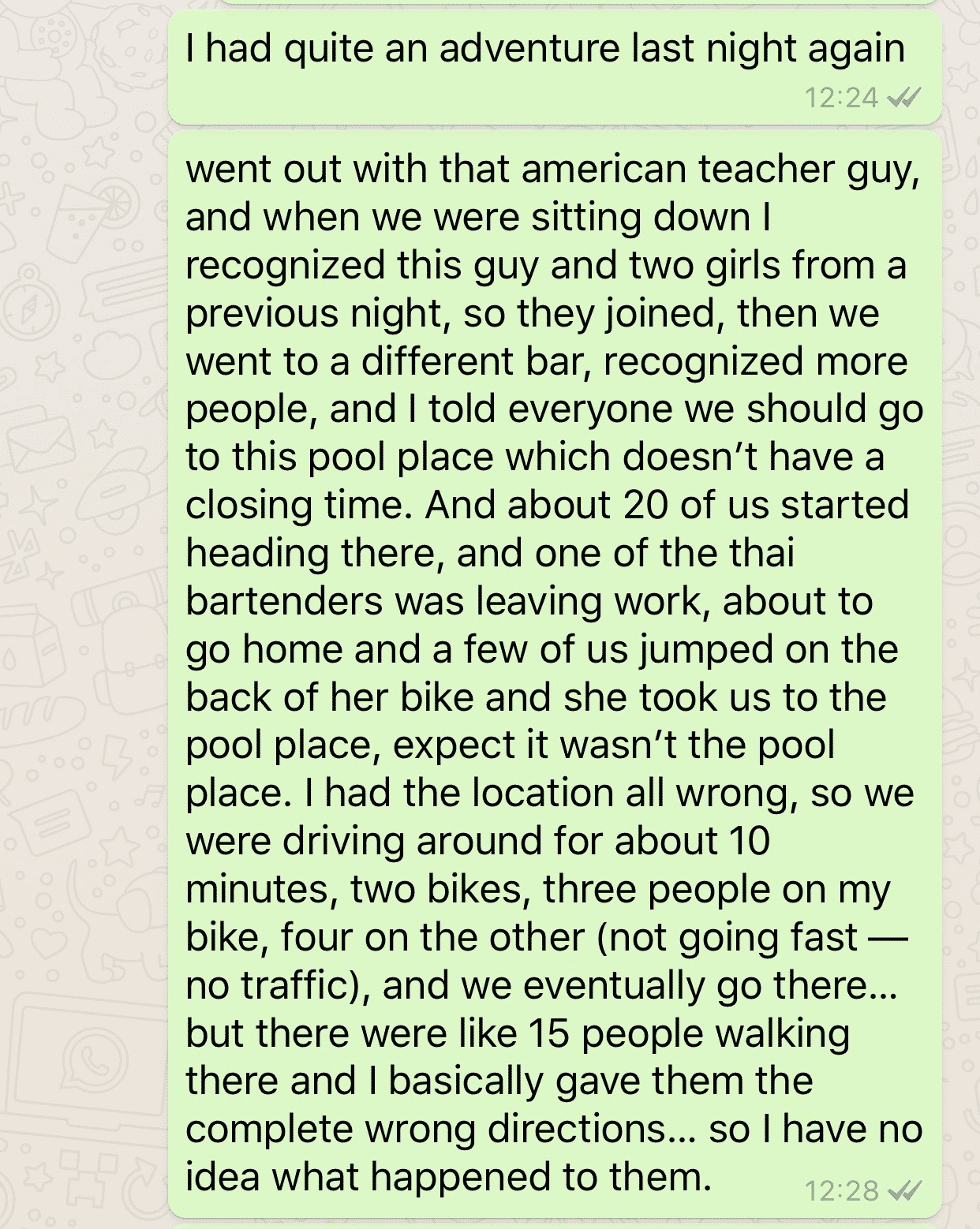
I got lost again. Perfect.
8) You “should not” listen to advice.
“Advice is what we ask for when we already know the answer but wish we didn’t.”
― Erica Jong
Before I went to Thailand it seemed everyone I spoke to was an expert on traveling. Here are just a few of the travel prescriptions I received from well-meaning people before I left:
- “You should not trust anyone.”
- “You should not live in the same place because it’ll be boring.”
- “You should not get too attached to the people you meet.”
- “You should not travel alone. It’s hard to make friends.”
- “You should not walk around at night on your own.”
- “You should stay in a hostel not an apartment.”
While I appreciate any help I can get, the moment someone’s life advice includes the phrase “You should do this,” is the moment I typically stop listening. This is what I call prescriptive advice. This form of advice comes as a neatly one-sized-fits-all pill and doesn’t address the unique intentions or goals of the receiver. Instead, I believe the best advice is the advice you already know but didn’t know you knew until something or someone pointed it out. I call this descriptive advice. Let me give you an example:
On my 8th day I arranged to go on a date with a girl. She suggested we go to the market, and said she wanted to sleep over after the date. I felt slightly uneasy about the situation. Since I was still relatively new to Thailand I was still affected by Western stereotypes and became a bit paranoid. Is she trying to manipulate me to buy her stuff? Is she a gold digger? Unsure how to handle my thoughts, I turned to HighExistence’s very own Martijn Schrip, who I once nicknamed the “the guiding voice in the meditation track of life.”
This was our message correspondence:
Me: We’re meant to be going to market tomorrow. And she hinted last night that after that we would go back to mine. Makes me a bit edgy.
Martijn: Why does it make you edgy?
Me: I feel like it’s a bit manipulative. You buy me stuff from market stalls. I’ll come back to your place. Like a trade.
Martijn: Did she hint that she wanted you to buy stuff for her?
Me: Um… I don’t know, but it’s a market. Kind of seemed to add up to that.
Martijn: That seems a bit prejudiced to me.
Me: When I write it, I see that I’m being distrusting. Yeah you’re right.
Martijn: People go to the market all the time to just have fun. Perhaps to eat something. Perhaps she wants to help you find something cool for yourself. If she’s working, she is probably proud she can sustain herself.
Me: Yeah this is true. It’s probably not a big deal at all, and I’m projecting.
Martijn: Yeah, probably. It’s good to meditate on it, and notice when you’re actually throwing filters out in the world, knowing that it’s just a thought. And these seem to be ones that want to protect your feelings. But its actually better to get used once, than prevent the chance of something nice happening at all.
Me: Damn. Yeah that’s a really, really good thought. Because it could be something I’ll always cherish. And it that doesn’t happen, it’s still learning: win/win.
Notice, Martijn did not once did he tell me what I should do. Instead he asked questions, listened to my response, and then offered observations about what I said. I didn’t gain a prescription from Martijn, but rather access to a perspective which I always had but couldn’t see.
And he was right, the market was so much more than a place to shop. My date and I spent most of the night having a foot massages, watching live jazz music, having awesome conversations, and getting drunk. It was nice.
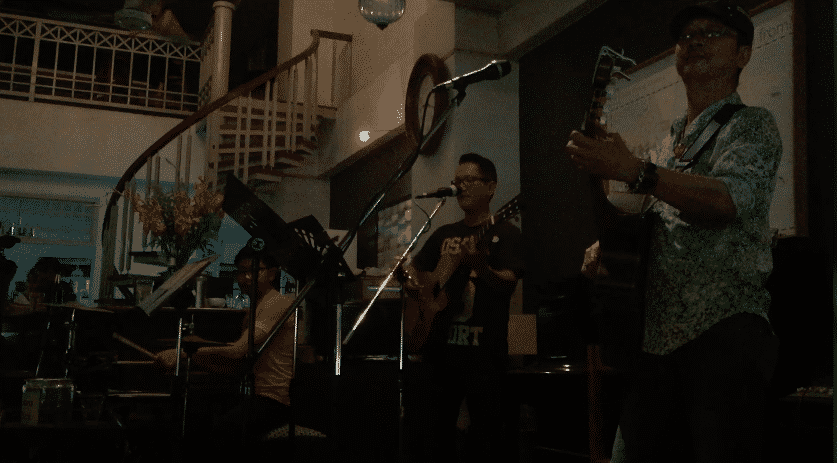
Conclusion: I wish suffering upon my friends.
If you are unwilling to endure your own suffering even for an hour, and continually forestall all possible misfortune, if you regard as deserving of annihilation, any suffering and pain generally as evil, as detestable, and as blots on existence, well, you have then, besides your religion of compassion, yet another religion in your heart (and this is perhaps the mother of the former) — the religion of smug ease. Ah, how little you know of the happiness of man, you comfortable and good-natured ones! For happiness and misfortune are brother and sister, and twins, who grow tall together, or, as with you, remain small together!
— Friedrich Nietzsche
I write this conclusion now after having spent forty-two days in Thailand and a further sixty days in Amsterdam. I’ve done lots of reflecting and want to leave you with one insight which I’ve been continually and consistently reminded of over the last three months more than any other:
The most gut-wrenchingly difficult times of my travels were always followed by the most elated experiences of my life, and the best lessons I learned were also the hardest.
We cannot experience the bliss of summiting our snow-topped actualized-selves without enduring and overcoming the avalanches along the way.
Setbacks are not mere annoyances on the road to success and growth, they are mother nature’s fertilizer, and they prevent us from being lulled into believing we are stronger than we are when we are weaker than we think.
Nietzsche put it like this: “…ask yourselves whether a tree that is supposed to grow to a proud height can dispense with bad weather and storms.”
If there is one thing I wish for you, my friend, it’s that you suffer through just a few of life’s storms. I do not want for you to break at the end of a lightning bolt, but rather to bend in the midst of forceful winds.
Do not climb the mountain, become the mountain.
Final note: If you find yourself anxious, afraid, uncertain, lost, or a stranger in a foreign land — even at home, I hope you find consolation in knowing you’re not the only one. When life gets tough, the important thing isn’t whether you succeed or fail, but take part. Yes, I know that’s an annoying cliché, but sometimes those are the best. Never give up, whatever happens it’ll make for an interesting story.

Jon Brooks
Jon Brooks is a Stoicism teacher and, crucially, practitioner. His Stoic meditations have accumulated thousands of listens, and he has created his own Stoic training program for modern-day Stoics.

